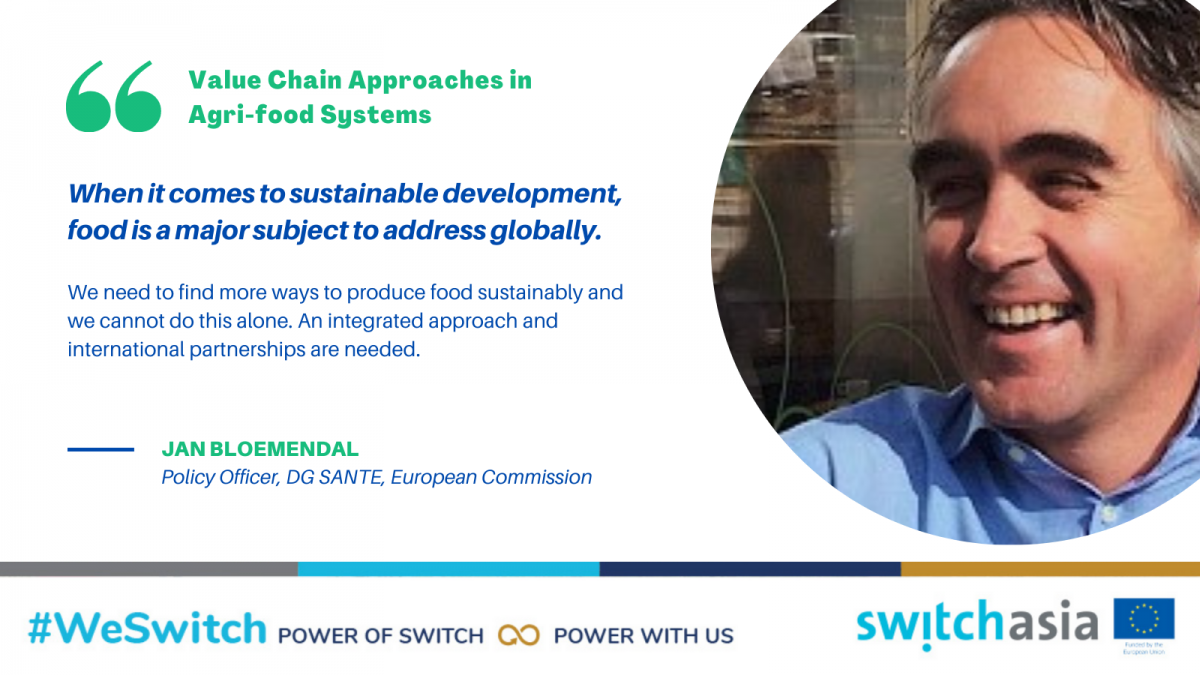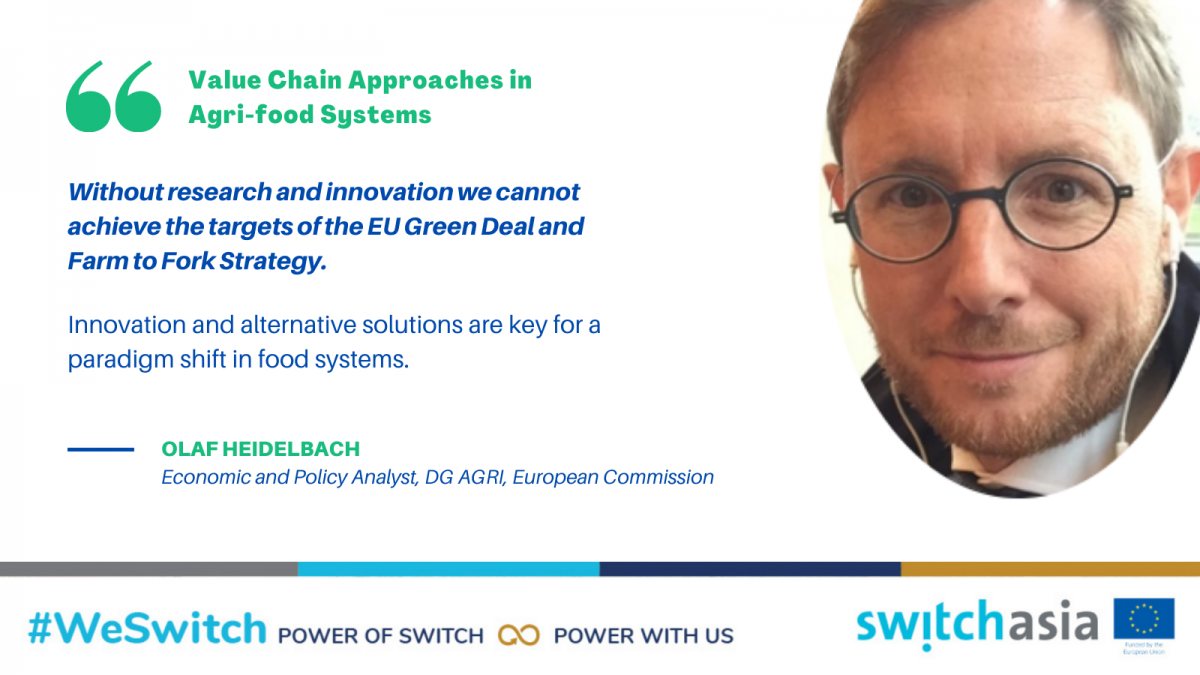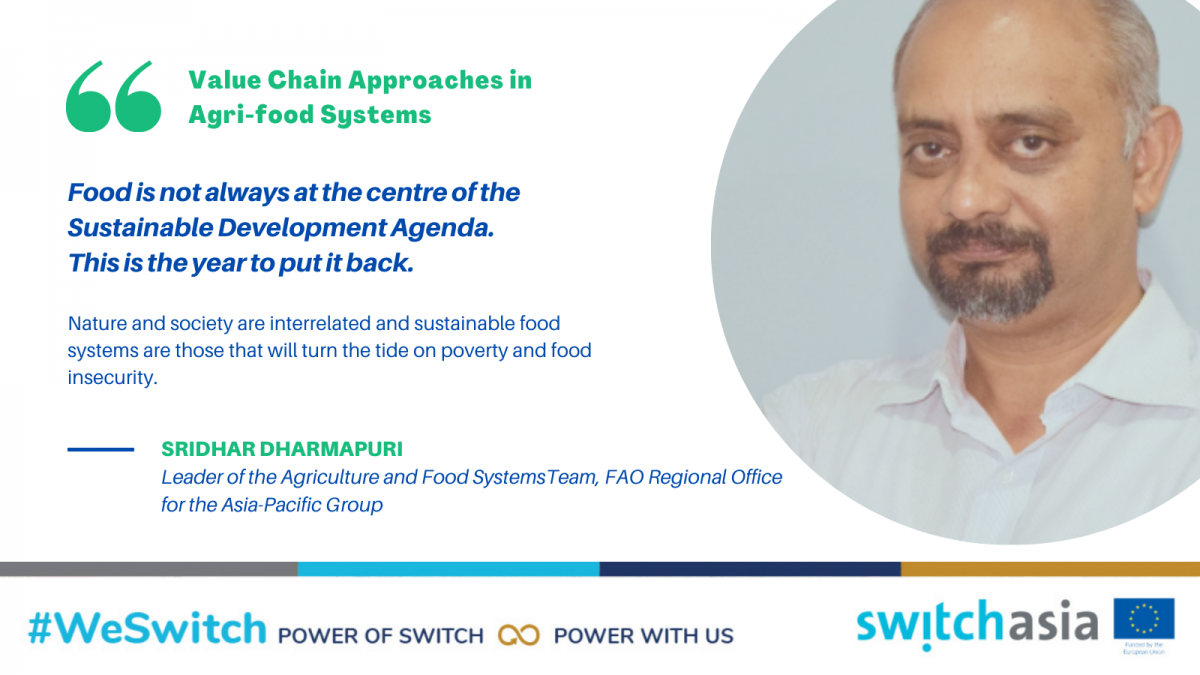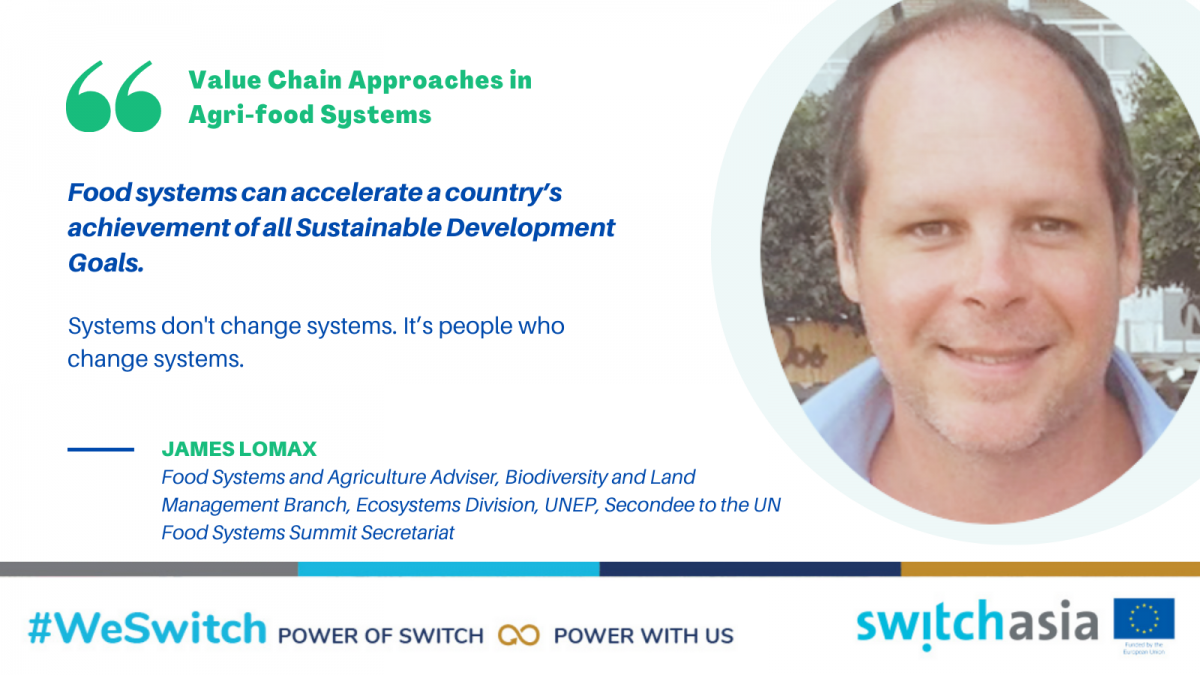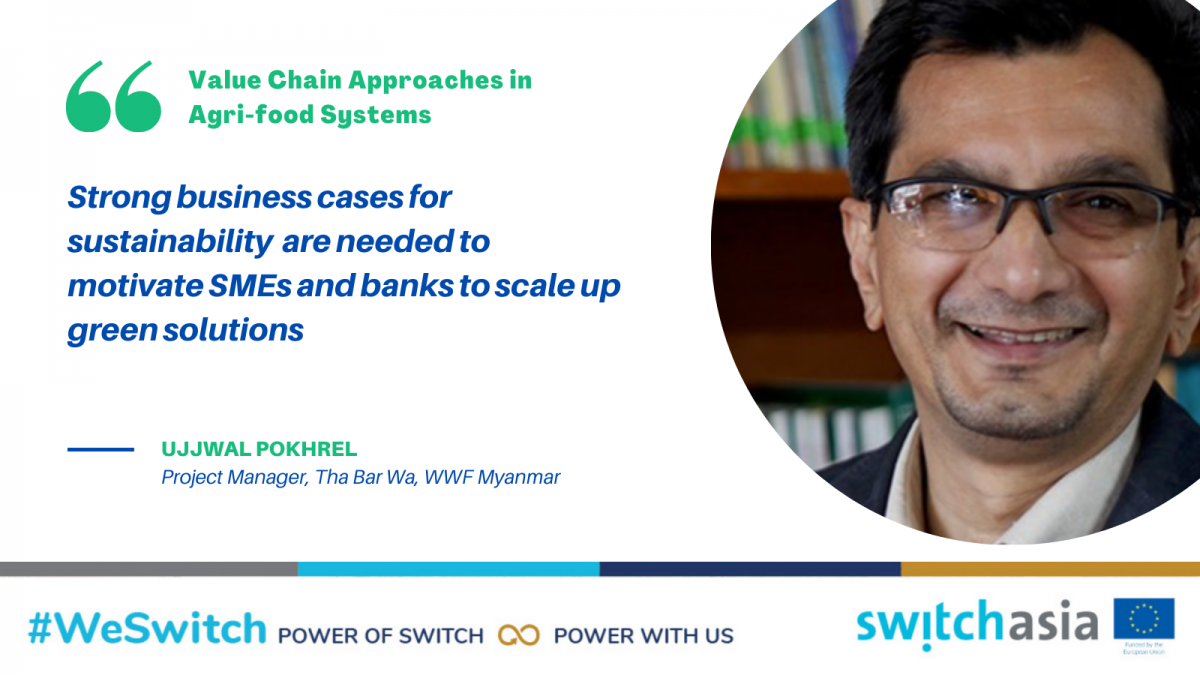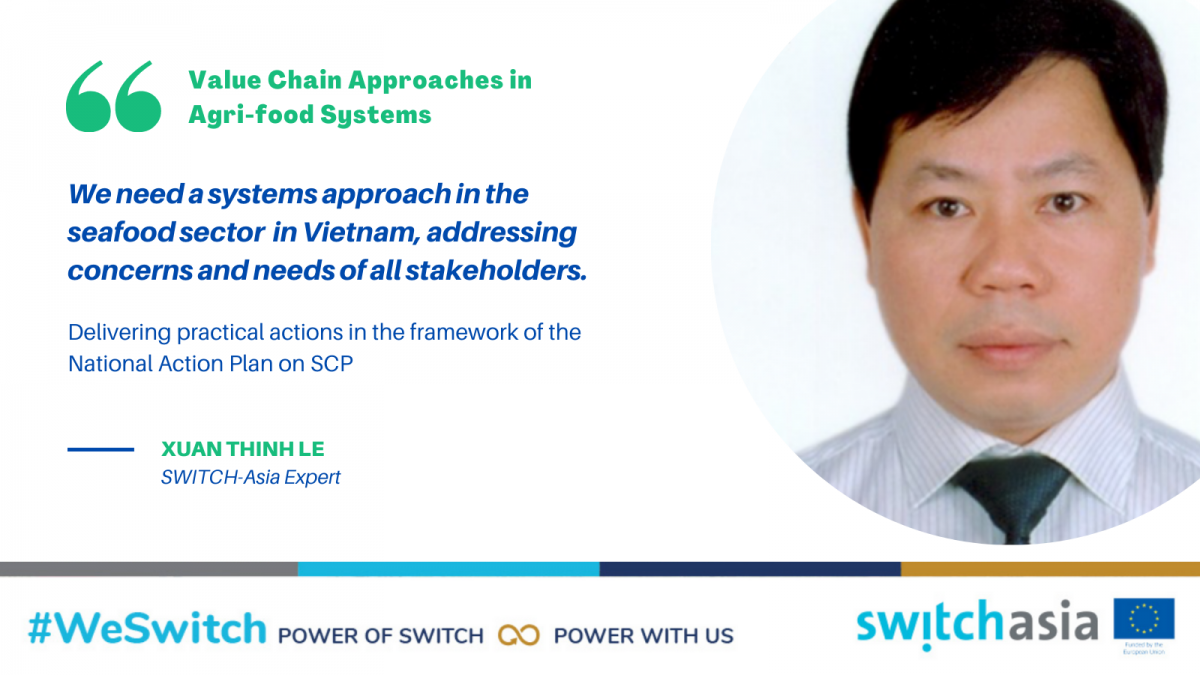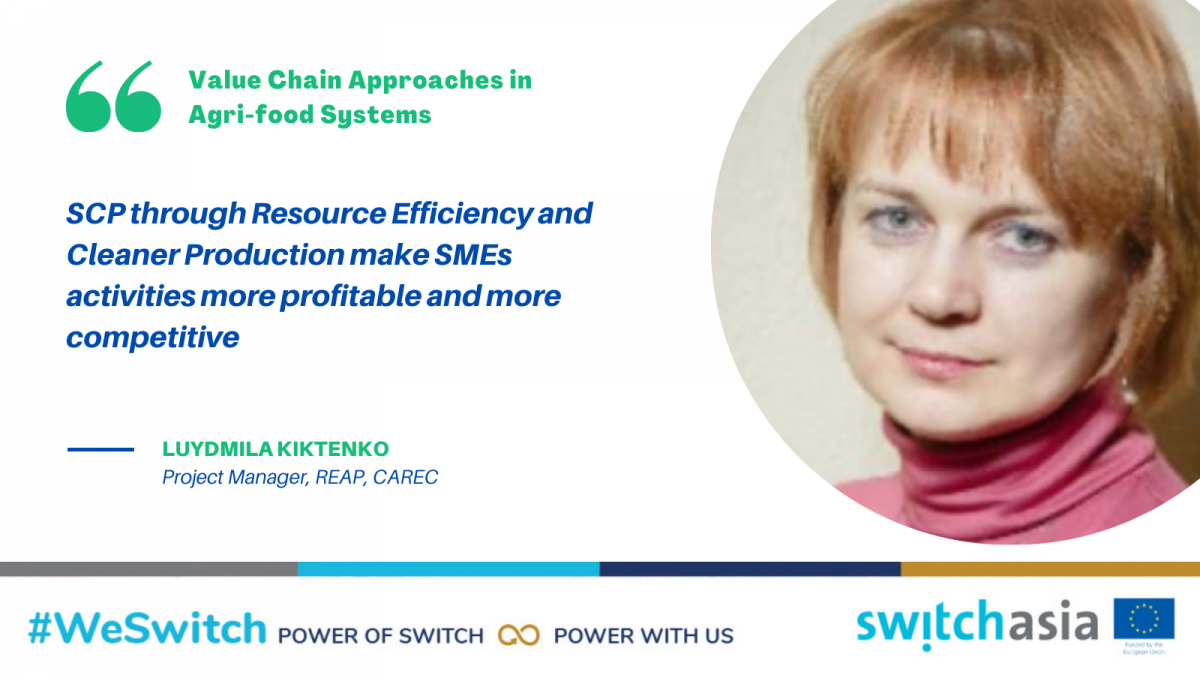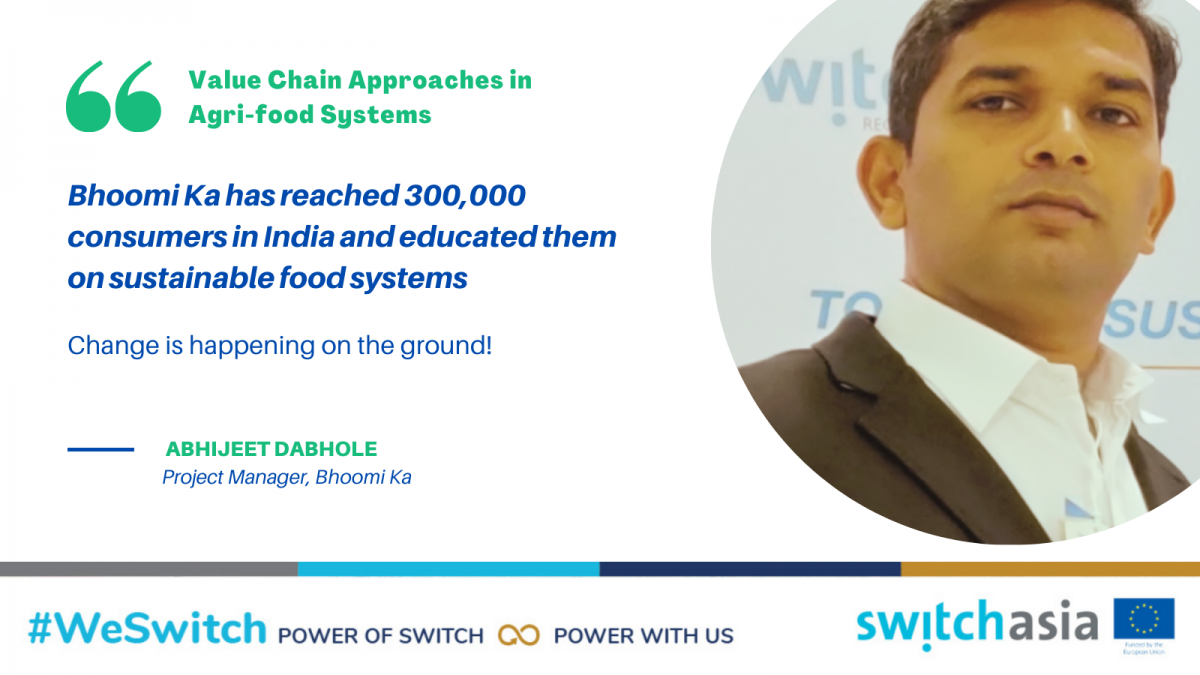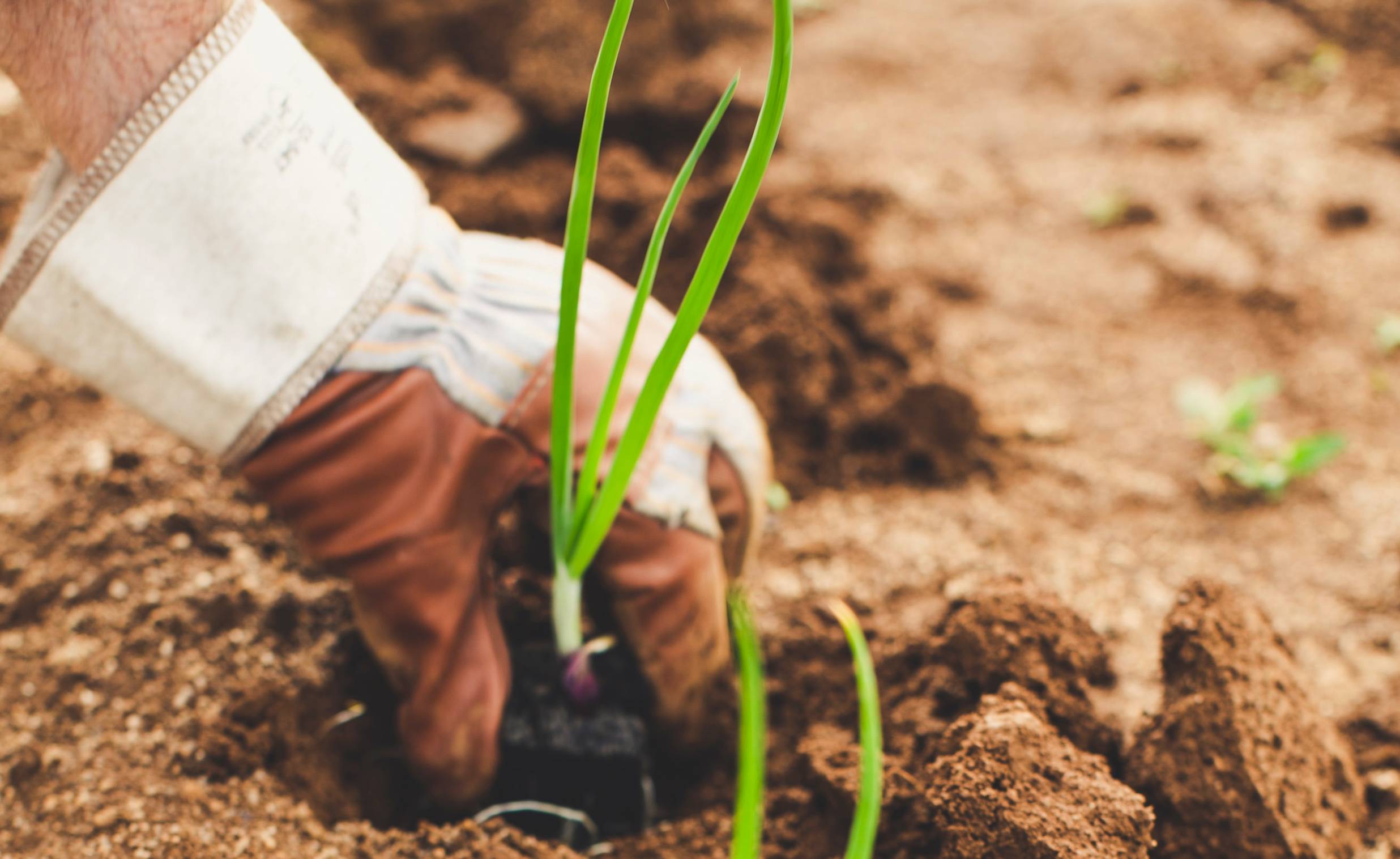
When: 26 May 2021 I Time: 1500 - 1700 (Bangkok Time) I Watch the VIDEO
The agri-food systems (AFS) are facing multiple and interlinked challenges, such as climate change and biodiversity loss, resource scarcity and food loss and waste generation along the supply chain. Globally, about 30% of all food that is produced is wasted.
The Agenda 2030 and the Sustainable Development Goals recognised this global challenge and governments have adopted its Target 12.3 of halving food waste at retail and consumer level and reducing food loss across the supply chain. The EU Farm to Fork Strategy was launched to address comprehensively the challenges of sustainable food systems. It recognises the inextricable links between healthy people, healthy societies and a healthy planet and highlights that the EU will support the global transition to sustainable food systems. The AFS’s role is pivotal in driving economic recovery, creating employment, household wellbeing and it is an economic powerhouse, making a main contribution to total economic output.
As result of the SWITCH-Asia Programme Steering Committee (PSC) Meeting held in December 2020, a series of “Internal thematic cluster consultative and brainstorming meetings” is now well inscribed in the programme as part of SWITCH-Asia activities 2021-mid-2022 and through joint efforts with partner countries and key organisations in the region.
For the clustered thematic issues focusing on the agri-food sector, the objective of the consultation and brainstorming meeting is to strengthen cooperation and partnerships in delivering activities through the three SWITCH-Asia components, involving the Country EU Delegations (EUDs), the National Focal Points (NFPs), the Grant projects, and selected regional/international partners, to ensure cross-border exchange of experiences and larger impact.
Objective
For the clustered thematic issues focusing on agri-food sector, the objective of the consultation and brainstorming meeting is to strengthen cooperation and partnerships in delivering activities through the three SWITCH-Asia components, involving the Country EU Delegations (EUDs), the National Focal Points (NFPs), the Grant projects, and selected regional/international partners, to ensure cross-border exchange of experiences and larger impact.
Speakers
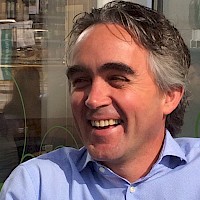 Mr. Jan BLOEMENDAL, Policy Officer, DG SANTE, European Commission
Mr. Jan BLOEMENDAL, Policy Officer, DG SANTE, European Commission
Jan Bloemendal works within the Unit for Bilateral international relations in DG SANTE, the DG for health and food safety of the European Commission. He is the desk officer for a number of countries east of the EU including Kazakhstan and others countries of Central Asia. He conducts negotiations for establishing SPS chapters of bilateral agreements and acts as co-secretary of SPS subcommittees once these agreements enter into force. Before he was employed in the Dutch administration with his last post being deputy chief veterinary officer.
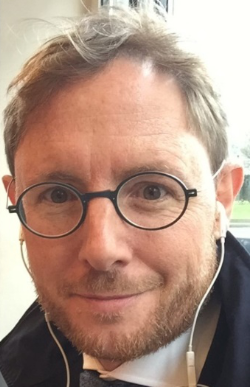 Mr. Olaf HEIDELBACH, Economic and Policy Analyst, DG AGRI, European Commission
Mr. Olaf HEIDELBACH, Economic and Policy Analyst, DG AGRI, European Commission
Dr. Olaf Heidelbach studied Agricultural Economics and Development Studies at the Universities of Hohenheim/Germany and Ȧs/Norway. In 2007 he defended his doctoral thesis on innovative risk management instruments in Kazakhstan's agricultural sector at the Martin Luther University in Halle/Germany. He has been an Associate Professor lecturing risk management and analysis in the MBA Programme of the American University of Central Asia in 2008 and 2009. Between 2007 and 2012 he has been working at the EU Delegation to the Kyrgyz Republic and has managed numerous projects and sector policy support programmes in Central Asia on good governance, education, and rural development involving civil society and government institutions. Between 2012 and 2017, he was the responsible programme manager at the EU Delegation to Azerbaijan for the sectors agriculture/rural development and budget support operations/public financial management and has acted as Head of Cooperation. Between 2017 and 2020 he managed at the EU Delegation in Sri Lanka the EU's interventions in agriculture/rural development and public financial management. Since September 2020 works as a policy analyst in DG AGRI with a focus on sustainable food systems.
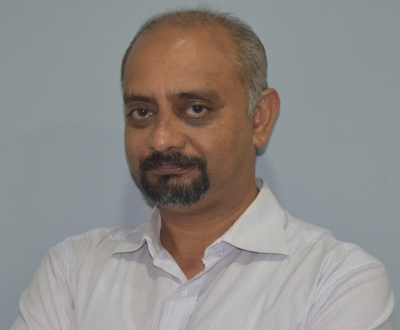 Mr. Sridhar DHARMAPURI, Leader of the Agriculture and Food SystemsTeam, FAO Regional Office for the Asia-Pacific Group
Mr. Sridhar DHARMAPURI, Leader of the Agriculture and Food SystemsTeam, FAO Regional Office for the Asia-Pacific Group
Sridhar Dharmapuri is Senior Food Safety and Nutrition Officer at the Food and Agriculture Organization (FAO) regional office for the Asia-Pacific in Bangkok, which covers 46 countries including the Pacific islands. He leads the UN agency’s work in the region on strengthening core elements of national food-safety systems and implementing food-safety standards and good practices for public health and trade. He also works on improving urban and rural food systems for the provision of safe and healthy diets. He is also closely involved in delivering FAO’s regional response to mitigating the impacts of the COVID-19 pandemic on food, agriculture and livelihoods. Mr. Sridhar holds a PhD in life sciences from Jawaharlal Nehru University in New Delhi and an MBA from the University of Kansas.
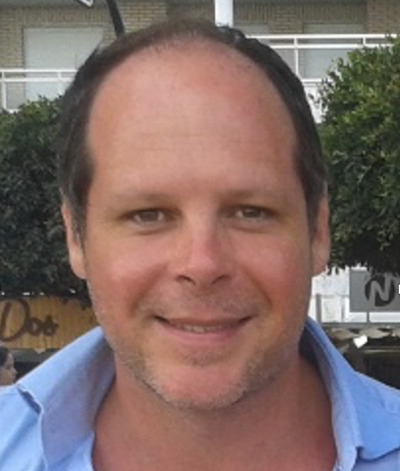 Mr. James LOMAX, Food Systems and Agriculture Adviser, Biodiversity and Land Management Branch, Ecosystems Division, UNEP, Secondee to the UN Food Systems Summit Secretariat
Mr. James LOMAX, Food Systems and Agriculture Adviser, Biodiversity and Land Management Branch, Ecosystems Division, UNEP, Secondee to the UN Food Systems Summit Secretariat
James Lomax is currently food systems and agriculture adviser in UNEP’s ecosystems division and part time secondee to the Secretariat of the UN Food Systems Summit. James has been leading efforts on sustainable food systems and agriculture at UNEP since 2009. He has pioneered the idea of systems thinking in the food and agriculture sector where nutrition, waste, environmental externalities and livelihoods must be considered if a shift to more sustainable food systems is to be realized. Currently, James is partly seconded to the Food Systems Summit and is also focusing on sustainable land-use finance mechanisms, repurposing farmer fiscal support, regenerative and net-positive agriculture and coordinating UNEP’s internal work on food systems and agriculture. A tropical agriculturalist by training (MSc Reading University), before joining UNEP James had a varied career in the private sector in farming, small holder development, food processing and export in East Africa and Europe.
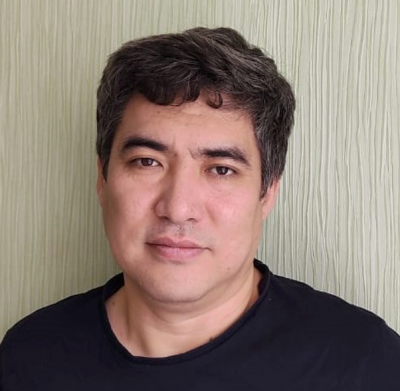 Mr. Yerbol ORAZBEKOV, SWITCH-Asia Expert
Mr. Yerbol ORAZBEKOV, SWITCH-Asia Expert
Mr. Yerbol has over 20 years of experience in waste management, including international legislation. He worked in international organizations in the field of environmental protection (National Ecological Center, International Center for Green Technologies and Investment Projects), and for over 13 years in international oil and gas companies (Tengizchevroil, North Caspian Operating Company). He is also author and head of the joint project of the OSCE and IGTIPC Attracting international experience and green technologies for the development of a solid waste management system in the Shchuchinsko-Borovsk and Bayanaul resort areas; initiator and co-leader of the "Jasyl Jol" project, the first electric car marathon in Kazakhstan.
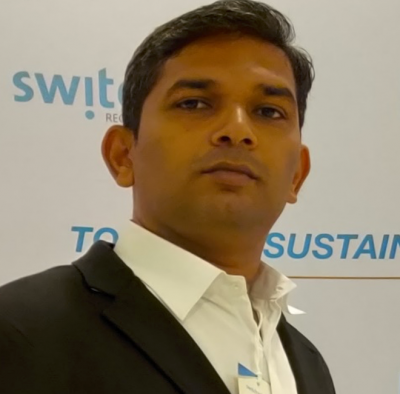 Mr. Abhijeet DABHOLE, Project Manager SWITCH-Asia Bhoomi Ka
Mr. Abhijeet DABHOLE, Project Manager SWITCH-Asia Bhoomi Ka
Mr. Abhijeet Dabhole is a graduate in horticulture and postgraduate in agri-business management from the University of Mumbai. His expertise lies in "organic value chain development" and "improving market access for small producers' institutions". He has 12 years of professional experience in imparting techno-managerial support for investigative, consultative, and remedial projects on natural resource management, climate resilient agriculture and sustainable agriculture value chains, across western, central, and southern Indian states. He is currently working with Welthungerhilfe and coordinating project on sustainable consumption and production systems.
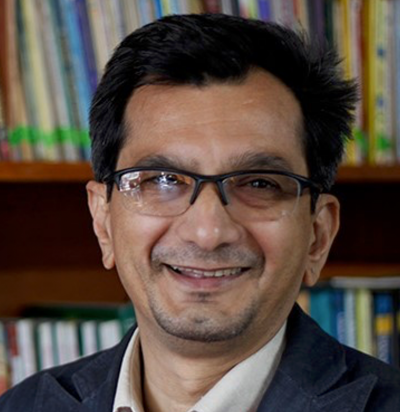 Mr. Ujjwal POKHREL, Project Manager SWITCH-Asia Tha Bar Wa
Mr. Ujjwal POKHREL, Project Manager SWITCH-Asia Tha Bar Wa
Ujjwal currently works with WWF Myanmar as a Project Manager - Sustainable Production and Green Finance for the SWITCH Asia funded Tha Bar Wa Project. Prior to joining WWF Myanmar, he has worked for Room to Read, Nepal as its Country Director and for UN Capital Development Fund (UNCDF) in Nepal as its National Program Manager respectively. Before UNCDF, he has worked in higher management positions with different national and international development organizations in Nepal and abroad including in the private sector. He is a practitioner of economic/ market development and private sector promotion approaches, tools and methodologies. Ujjwal has more than seventeen years of professional experience managing and leading large scale portfolios in the areas of market system development, Value Chain Development (VCD), Inclusive Business (IB), Business Development Services (BDS), Micro, Small and Medium Enterprises (MSMEs) development, Local Economic Development (LED), sustainable production, circular economy, green financing, among others.
 Mr. Ply PIROM, Project Manager Sustainable Consumption and Production, WWF Thailand
Mr. Ply PIROM, Project Manager Sustainable Consumption and Production, WWF Thailand
Mr. Ply is a sustainable development advocate and environmental activist. His current role is a project manager, Sustainable Consumption and Production, for WWF (Thailand), and sustainability consultant to the leading retail business companies and the Stock Exchange of Thailand (SET). His past 20 years experiences range from the fields of engineering, urban environmental management, circular economy, value chain development, renewable energy, forest restoration and agroecology, environmental project development, and sustainability policy. He has well established his reputation within the governmental, communities and industrial and business sectors in Thailand.
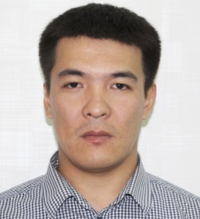 Mr. Asan ALYMKULOV, Consultant Federation of the Organic Movement Bio- Kg, Kyrgyzstan
Mr. Asan ALYMKULOV, Consultant Federation of the Organic Movement Bio- Kg, Kyrgyzstan
Mr. Asan is an expert in Organic agriculture, Organic Guarantee Systems, Participatory Guarantee System, Bioeconomy in mountain regions. He has worked in the field of organic agriculture for more than 15 years. In 2014, he was invited to join the BIO-KG Federation of Organic Development team, with the main objective to lobby and advocate for organic agriculture in the country, promoting it in organic aymaks (villages) through practical implementation methods. He is also an active member of the Organic Youth Forum, which includes more than 2000 members from more than 40 countries. In Philippines, during the Asian Organic Congress, Mr. Asan was awarded the Organic Youth Ambassador.
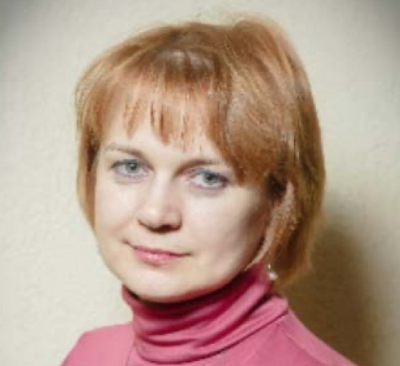 Ms. Luydmila KIKTENKO, Project Manager SWITCH-Asia Resource Efficiency in Agri-food Production and Processing (REAP)
Ms. Luydmila KIKTENKO, Project Manager SWITCH-Asia Resource Efficiency in Agri-food Production and Processing (REAP)
Ludmilla Kiktenko has been working for CAREC since 2008 where she is currently Manager of the Environmental Management Programme and EU funded projects: Nexus Dialogue in Central Asia and SWITCH-Asia Resource Efficiency in Agri-food Production and Processing (REAP).
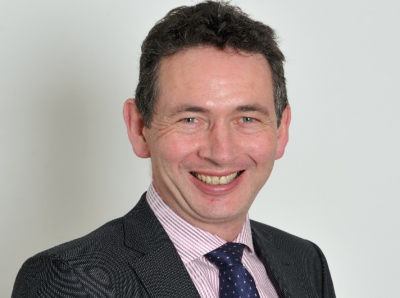 Mr. Marcus GOVER, Chief Executive, WRAP
Mr. Marcus GOVER, Chief Executive, WRAP
Marcus Gover has worked in the environment sector for over 25 years and has been Chief Executive Officer of WRAP since 2016. WRAP is an independent charity working with governments, businesses and citizens to improve the way natural resources are used and specialising in the sustainability of food, plastics and clothing. Before WRAP, Marcus was Commercial Director of Biojoule, a small start-up renewable energy company and a Director of AEA Technology Environment - an international technical services business that is now part of Ricardo. Marcus has a degree and PhD in chemical engineering from Imperial College as well as an Executive MBA from Cranfield School of Management.
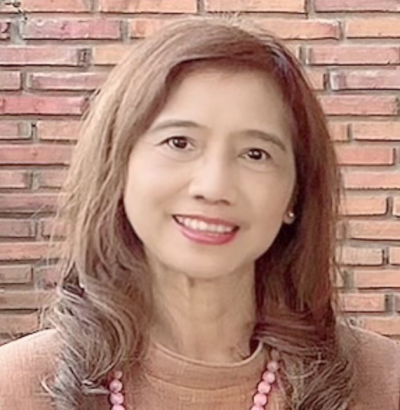 Ms. Pouchamarn WONGSANGA, Senior Regional Coordinator of the ASEAN Sustainable Agri-food Systems Project
Ms. Pouchamarn WONGSANGA, Senior Regional Coordinator of the ASEAN Sustainable Agri-food Systems Project
Ms. Pouchamarn Wongsanga is currently working as Project Director, Agriculture and Food Cluster of Deutsche Gesellschaft für Internationale Zusammenarbeit (GIZ) GmbH or GIZ, based in Thailand. She joined GIZ in 2014 as Senior Regional Coordinator for the ASEAN-German Project on Sustainable Agrifood Systems (SAS) during 2014-2019. Now, she is Regional Component Leader of the ASEAN-German project on Promotion of Sustainable Agriculture Value Chain (ASEAN AgriTrade), 2020-2023. Besides, she oversees the Public and Private Partnership Project on “Improving Small holders Coffee Farming Systems in Southeast Asia (Coffee+), Thailand. In addition, she also supervises other projects commissioned by German Government to support ASEAN and ASEAN Member States in the implementation of ASEAN Policy Framework in Agriculture and Food, COVID-19, and related Global initiatives as well as SDGs.
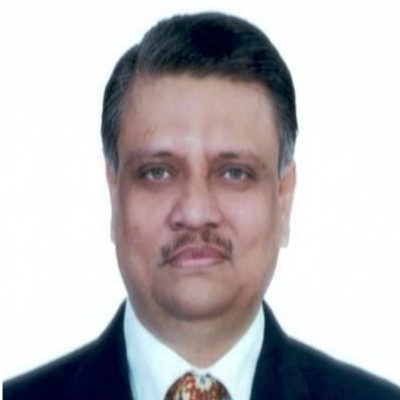 Mr. Manish Shankar, Associate Vice President Intellecap Advisory Services Private Limited
Mr. Manish Shankar, Associate Vice President Intellecap Advisory Services Private Limited
Manish Shankar works as an Associate Vice President with Intellecap Advisory Services, a development advisory firm devoted, among other things, to improving efficiency of agriculture ecosystem to create sustainable livelihoods for smallholder farmers. A post graduate from Indian Institute of Forest Management (IIFM), Bhopal; he has 25 years of experience in domains of social research, program designing, program implementation, and consulting. For the last decade, he has been involved in developing and implementing several projects involving agriculture value chains in emerging markets of Asia and Africa. Manish is currently involved in curating an action platform for promoting circularity in agriculture production, processing, and distribution in India.
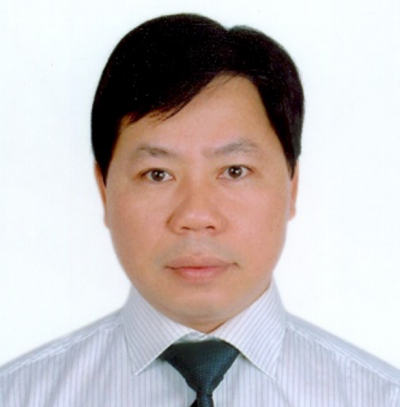 Mr. Thinh LE XUAN, Consultant of Resources Efficient and Cleaner Production, Director of Vietnam Cleaner Production Centre (VNCPC)
Mr. Thinh LE XUAN, Consultant of Resources Efficient and Cleaner Production, Director of Vietnam Cleaner Production Centre (VNCPC)
Mr. Thinh holds a University degree in chemical engineering from Hanoi University of Science and Technology, a master's degree at AIT (Thailand), and a diploma from TU Dresden (Germany), and preparing to finish his Ph.D. in environmental engineering at the Hanoi University of Science and Technology. Mr. Thinh has more than 15 years of experience in research, consulting, and technology transfer in the fields of environment, climate change, and sustainable development. Up to now, together with his associates, they have carried out consulting works in the fields of Cleaner Production, Energy Efficient, Clean technology transfer, Environmental management, Climate change, sustainable consumption and production, eco-industrial parks, and industrial symbiosis for more than 1,000 SMEs in sectors including cement, iron and steel, paper, seafood, working with different donors such as UNIDO, UNEP, EU, DANIDA, UNDP, CIDA, Brands, among others.
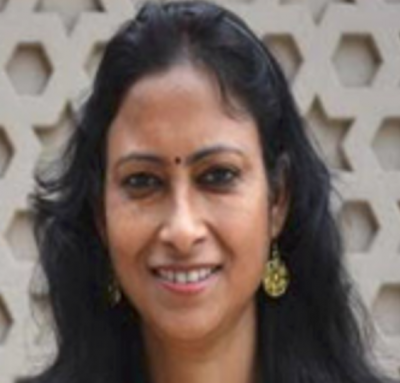 Gitika GOSWAMI, Senior Programme Director, Policy Research & Planning
Gitika GOSWAMI, Senior Programme Director, Policy Research & Planning
Gitika, with more than twenty-two years of experience in the environment and development sector, has been working as a Senior Programme Director at Development Alternatives (DA) for the last five years. Her current portfolio includes Climate Change Resilience, Inclusive Development and Sustainable Consumption and Production, with a mandate of influencing and supporting public policy in the transition towards sustainable development. Her focus areas of functions are sustainability research, collaborative perspective buildings, capacity development and planning and advocacy for policy change. Her specialisation includes Climate change adaptation, Nature Based Solutions, Natural Capital and SDGs both in rural and urban landscapes. She is an active member of several networks which includes Green Economy Coalition, a coalition of seven countries of Global South and working towards mainstreaming green transition at National level and is a working group member of Natural Capital for Green Growth Knowledge Platform (GGKP) from India.
Key Messages
